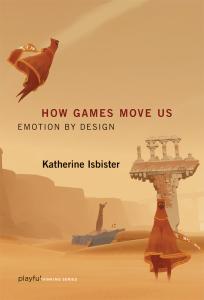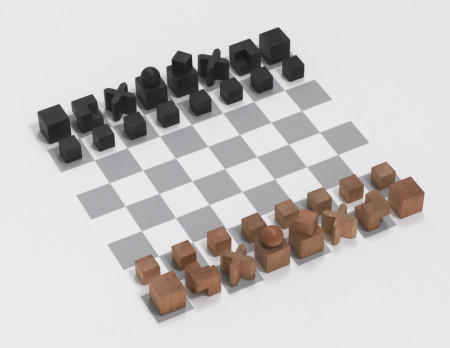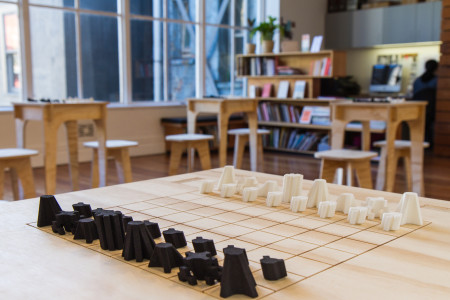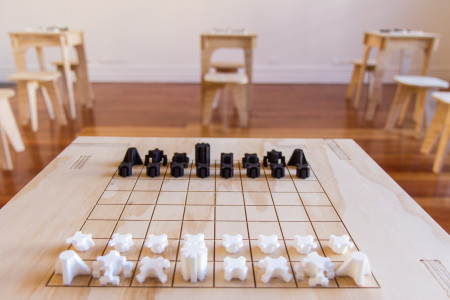 I am interviewing Katherine Isbister on the MIT Press website about her new book How Games Move Us (in the Playful Thinking series).
I am interviewing Katherine Isbister on the MIT Press website about her new book How Games Move Us (in the Playful Thinking series).
My name is Jesper Juul, and I am a Ludologist [researcher of the design, meaning, culture, and politics of games]. This is my blog on game research and other important things.
 I am interviewing Katherine Isbister on the MIT Press website about her new book How Games Move Us (in the Playful Thinking series).
I am interviewing Katherine Isbister on the MIT Press website about her new book How Games Move Us (in the Playful Thinking series).
 Feel free to share: I am now head of the Game Art, Design and Development master’s program at KADK in Copenhagen. Application deadline for the 2016-2018 class is March 1st. Please join us!
Feel free to share: I am now head of the Game Art, Design and Development master’s program at KADK in Copenhagen. Application deadline for the 2016-2018 class is March 1st. Please join us!
Applications are now open for the Game Art, Design and Development master’s program at KADK – the Royal Danish Academy of Fine Arts, School of Design in Copenhagen.
This is a two-year program running from September 1, 2016. The application deadline is March 1st.
Game Art, Design and Development is a master’s-level game program with an emphasis on visual design, while giving students the technical and design skills needed to build game prototypes and full games, as well as allowing for theoretical projects.
During the two-year program, students will continually be making games, while learning graphical design, 3D modeling and animation, Unity3D, game design, game studies and video game history. As part of the program, students partake in a full-semester large game production with students from multiple universities.
The program prepares graduates for a career in the game industry and beyond, either as entrepreneurs or as employees.
Who can apply?
The master’s program in Game Art, Design & Development is in English, and is open to all students, Danish and International, with a relevant bachelor’s degree in fields such as graphical design, game design, or 3D modeling.
More about the program
To read more about the program, go to the website or email program head Jesper Juul, jjuul@kadk.dk
https://kadk.dk/en/programme/game-art-design-and-development
How to apply
Please find application details on the admissions page
https://kadk.dk/en/admission-ma-design
Tuition
Tuition information at https://kadk.dk/en/tuition-fee-0
Why study at KADK in Copenhagen?
KADK is a leading academy in Scandinavia in the fields of architecture, design and conservation. It is located centrally in Copenhagen.
Copenhagen is a hub for video game development, with a vibrant English-language game development community, and home to both small and bigger companies such as Sybo games, IO Interactive and Unity3D.
Remember when the current console generation was being launched, and there was a widespread idea, also shared by me, that the PS4, Xbox One and Wii U were going to fail in the face of tablets, mobile phones, indie games, and all? That the new generation was a “prayer to stop time“?
And many articles on “Why consoles gaming is dying“, “Consoles are dying“?
And yet here we are. Ars Technica has an article comparing sales across console generations, with the current generation doing much better than the previous one, on a quarter-to-quarter basis.
I suspect that the story was that many critics, myself included, were personally jaded by console hardware, and much more interested in indie and experimental games than in the latest military shooter. But our sentiments just weren’t widely that shared. People still want new games on new hardware, even if they only look marginally better than those of the previous generation. The PS4 is slick, and the share button is worth paying for. You also buy a new console because that is where the games are going to be.
Also, cloud gaming never took off (and I suspect it won’t due to latency issues).
Yes, you can be wrong.
PS. And Super Mario Maker is also an exhilarating experience.
For your very real, theoretical pleasure:
| Editorial — Game Studies In Media Res: Beginning From The Middle-State | |
| Michael Hancock, Steve Wilcox | |
| Editorial introduction to this special guest-edited issue of Loading. |
| The Tyranny of Realism: Historical accuracy and politics of representation in Assassin’s Creed III | |
| Adrienne Shaw | |
| Like other games in its series, Assassin’s Creed III (AC3) is heavily invested in a wellresearched, nuanced representation of historical… |
| Disability, Neurological Diversity, and Inclusive Play: An Examination of the Social and Political Aspects of the Relationship between Disability and Games | |
| Sarah Gibbons | |
| This article explores existing connections between disability studies and game studies, and suggests how the two fields might greater inform each… |
| Renegade Sex: Compulsory Sexuality and Charmed Magic Circles in the Mass Effect series | |
| Meghan Blythe Adams | |
| This article examines portrayals of sexuality in video games, particularly in terms of the increasing inclusion of queer and non-normative… |
| Cyborg Games: Videogame Blasphemy and Disorientation | |
| Elise Vist | |
| This paper describes the genre of “cyborg games,” using examples of independent videogames (such as Gone Home) to illustrate the genre, as well… |
| Going Beyond the Game: Development of Gamer Identities Within Societal Discourse and Virtual Spaces | |
| Jan Grooten, Rachel Kowert | |
| What is a ‘gamer’? And what does it mean to be a gamer today? This paper will address these questions through a theoretical discussion of the… |
| The Game FAVR: A Framework for the Analysis of Visual Representation in Video Games | |
| Dominic Arsenault, Pierre-Marc Côté, Audrey Larochelle | |
| This paper lays out a unified framework of the ergodic animage, the rule-based and interactiondriven part of visual representation in video games…. |
CFP: Journal of the Philosophy of Games
The Journal of the Philosophy of Games (JPG) welcomes papers for the inaugural issue. JPG is an open-access publication hosted by the University of Oslo, Norway.
JPG aims to explore philosophical issues raised by the study of games, with a particular emphasis on computer games. We invite contributions both from traditional philosophers and from scholars in other disciplines.
Articles are subject to double blind review and evaluated on the basis of originality, philosophical argumentation and mastery of relevant literature.
The journal does not accept submissions that are under consideration for other publications.
Examples of issues for which we invite submissions are definitions of key concepts in the study of games, the ontological status of objects and events in games, the nature and role of mental attitudes central to game play, rules, the player-avatar relationship, the moral evaluation of in-game actions or the societal role of games.
Contributions should make use of specific examples of games and not merely invoke them in general terms.
We welcome book reviews. Please contact the editorial board to ascertain that a review would fit the editorial profile.
The submissions should be no longer than 7000 words and adhere to the Chicago Manual of Style, Sixteenth Edition. Articles are submitted electronically on the journal website. Please refer to the author guidelines. The final deadline for the inaugural issue is March 1, 2016.
A separate call will be issued in 2016 for a special issue about the theme “Meaning and Computer Games” (Editor Sebastian Möring).
Editorial board
C. Thi Nguyen, Utah Valley University, United States
Johnny Hartz Søraker, Department of Philosophy, University of Twente, Netherlands
Anita Leirfall, University of Bergen, Norway
Prof. Dr. Stephan Günzel, BTK – University of Art and Design, Germany
Patrick John Coppock, University of Modena and Reggio Emilia, Italy
Rune Klevjer, University of Bergen, Norway
Olli Leino, City University Hong Kong, Hong Kong
John Richard Sageng, University of Oslo, Norway (Editor-in-Chief)
Advisory board
Olav Asheim, University of Oslo, Norway
Kendall Walton, University of Michigan; Stanford University, United States
Grant Tavinor, Lincoln University, New Zealand
Ian Bogost, Georgia Institute of Technology, United States
Espen Aarseth, IT-University of Copenhagen, Denmark
Luciano Floridi, University of Oxford, United Kingdom
Graeme Kirkpatrick, University of Skovde, Sweden
Don Ihde, Stony Brook University, United States
Thomas Hurka, University of Toronto, Canada
Eric Olson, University of Sheffield, United Kingdom
David Myers, Loyola University, United States
Jesper Juul, The Royal Danish Academy of Fine Arts, Denmark
Dominic Lopes, University of British Columbia, Canada
https://www.journals.uio.no/
https://www.facebook.com/
https://www.gamephilosophy.org
 |
Journal of the Philosophy of Games |
 When discussing rules and fiction in games, I invariably show a picture of
When discussing rules and fiction in games, I invariably show a picture of
the beautiful Bauhaus chess set, where the superfluous ornamentation and fiction of the standard chess set has given way to shaped pieces meant to indicate how each piece moves. And it is easy to illustrate how some pieces signal well – the bishop, the rook – where others quickly fail. How are you supposed to deduce en passant from the cube that is the pawn?
Artist Nova Jiang has now one-upped Josef Hartwig considerably with her Orthogonal/Diagonal art piece. Here, Jiang not only makes a better version of the pawn in Western chess (the pawn’s diagonal attacks are now suggested by the form), the work also includes a range of Asian chess variants.


And of course – we never get to quite deduce the entirety of game rules from the shape of the pieces, but it’s just interesting to see that the basic question of how to shape chess pieces does not need to be left to the history books.
For your analog interests, here is Volume II, Issue VII of Analog Game studies.
Manipulating Environments in American Freeform – Jason Cox
Playing With Portals: Rethinking Urban Play With Ingress – Kyle Moore
The Eurogame of Heterotopia – Devin Wilson
The First Nations of Catan: Practices in Critical Modification – Greg Loring-Albright
In this final issue of the year, we are exploring material components of analog gameplay. The materiality of games is important to consider as it lends insight into the ways that games can be located within the clear parameters of space and time—often despite the best efforts of players and designers to otherwise construe them as timeless or nostalgic media. Additionally, materialities help to remind us of the limitations of play. Our bodies must navigate black-box theater rooms and city spaces, as manipulate pawns, chits, meeples, cards and other trappings of board games. These deliberate, sometimes awkward, yet often tacit negotiations help to remind us of the always-present stakes of materiality.
Jason Cox’s essay “Manipulating Environments in American Freeform” offers a starting point for those curious about the ways in which emerging practices of larp design offer more to players than just narrative—they tell stories about spaces as well, and attend to how environments affect our bodies. This is also what is at stake in Kyle Moore’s essay, “Playing With Portals: Rethinking Urban Play with Ingress,” a theoretical sketch of the ways that the game, formerly a Google product, compels players to experience urban space in new and often challenging ways. Finally, the last two essays in this issue, Devin Wilson’s “The Eurogame as Heterotopia,” and Greg Loring-Albright’s “The First Nations of Catan: Practices in Critical Modification”—both in dialogue with last year’s AGS essay by Will Robinson—take up critiques of the abstracted representations characteristic of Eurogames. Wilson’s piece argues for a new and less oppositional reading of abstract game materials, positioning them as a space of polysemic and potentially revolutionary interpretation. In contrast, Loring-Albright moves forward from the problematic of abstraction established by Robinson by offering a new critical ruleset for Catan that accounts for the erasure of indigenous peoples in the game’s narrative. And, in the spirit of materiality: we’ve included the rules as a bonus to our readers.
Thank you, readers, for an excellent year, and keep an eye out in the coming months for more exciting content!
-The Editors
November 9, 2015
For your theory itch: Journal of Virtual Worlds Research issue 8, 2.
From the point of view of 2015: the virtual is becoming the real and the real is becoming the virtual.
| Toward the Futures of Real AND Virtual Worlds | |
| Yesha Y. Sivan |
| Three Real Futures for Virtual Worlds | |
| Tom Boellstorff |
| Is a Technological Singularity Near Also for Bots in MMOGs? | |
| Stefano De Paoli |
| Conceptualizing Factors of Adoption for Head Mounted Displays: Toward an Integrated Multi-Perspective Framework | |
| Ibrahim Halil Yucel, Robert Anthony Edgell |
| Being There: Implications of Neuroscience and Meditation for Self-Presence in Virtual Worlds | |
| Carrie Heeter, Marcel Allbritton |
| The eSports Trojan Horse: Twitch and Streaming Futures | |
| Benjamin Burroughs, Paul Rama |
| The Metaverse as Mediator between Technology, Trends, and the Digital Transformation of Society and Business | |
| Sven-Volker Rehm, Lakshmi Goel, Mattia Crespi |